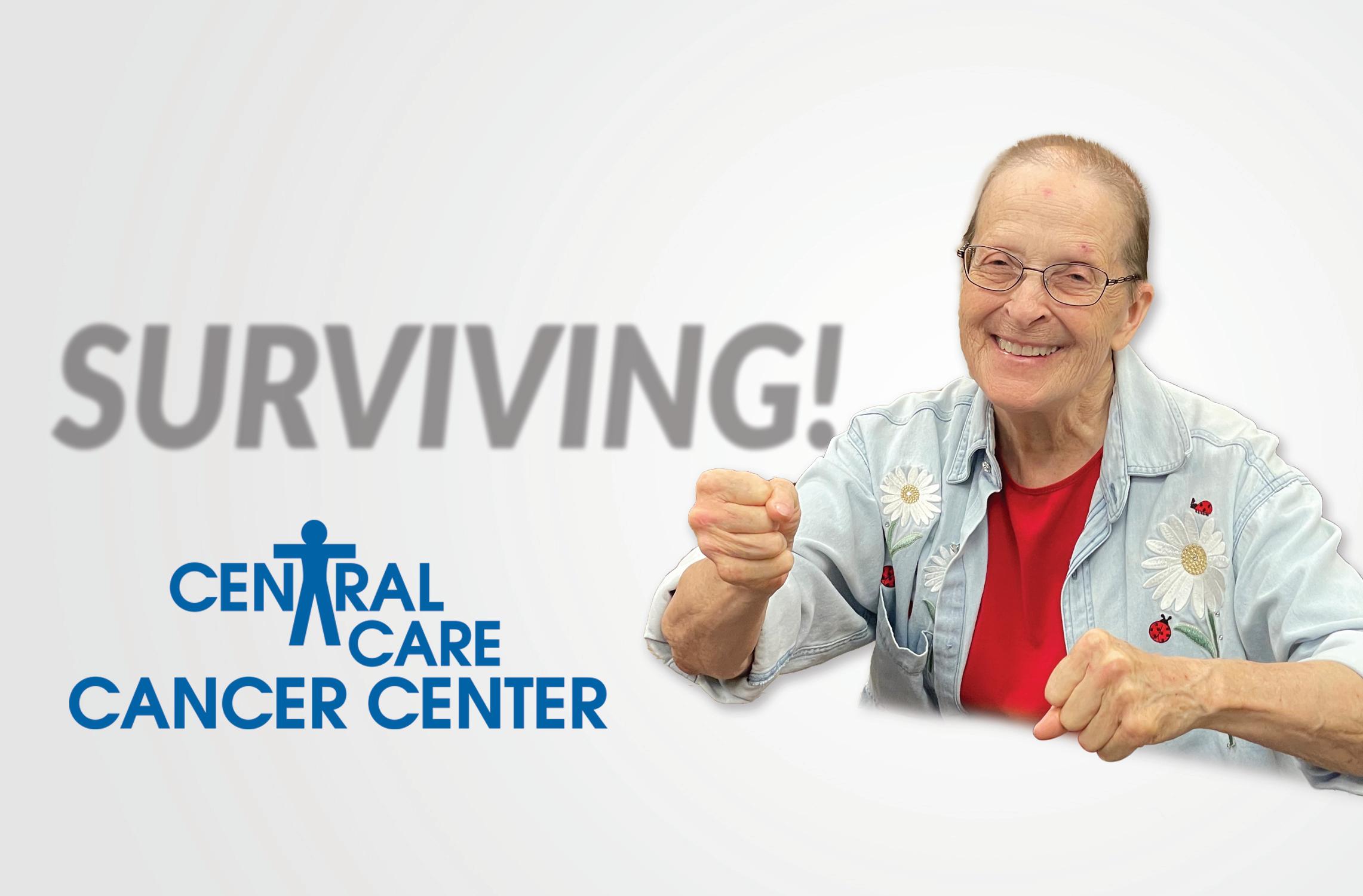
4 minute read
FEATURE
Feature
Cancer Doesn’t DefineYou You

As a breast and liver cancer fi ghter, 73-year-old Vicki McDowell is the epitome of positivity. “I am surviving. You see, there’s this one thing – cancer doesn’t defi ne who you truly are.”
It all started in 2004. Vicki had a mammogram where her doctor discovered a lump and diagnosed her with breast cancer. She had it removed and began radiation treatment, but in 2006, her doctor found another lump in her breast. This time, she had a mastectomy and for six years, Vicki was cancer-free.
That was until 2012, when she noticed pains along her mastectomy incision. She got a CAT scan which showed multiple spots in her liver, and was referred to see Dr. Mark Fesen at Central Care Cancer Center in Great Bend, who diagnosed her with Stage 4 liver cancer. For the fi rst few months, Dr. Fesen had Vicki on the chemotherapy medication Taxol while he investigated the source of her liver cancer.
“Dr. Fesen, being the way that he is, wasn’t satisfi ed with the answers,” Vicki explains, “He kept sending out biopsies and blood work, everything to various colleagues. Finally, a lab in California found it. I was HER2-Positive.”
HER2 is a protein that promotes growth on the outside of all breast cells. Breast cancer cells with higher than normal levels of HER2 are called HER2postive. These cancers tend to grow and spread faster than other breast cancers, but are more likely to respond to treatment with drugs that target the HER2 protein.
At the time she found out about her liver cancer, Vicki’s husband of 51 years, Jim, was living in Oklahoma City waiting for a heart transplant. The couple was only able to see each other on weekends for lunch in Wichita, and with the impending heart surgery, Vicki was nervous to tell Jim about her liver.
“At fi rst I didn’t tell him because I knew,” Vicki says, “I knew that he would quit and he was already pretty high up on the list for a new heart.” Jim did successfully receive his heart transplant in December of 2012.
Vicki continued with the Taxol regimen, but Dr. Fesen noticed that her progress was starting to plateau and wanted to try something else. He explored the options and suggested she participate in a clinical study involving the chemotherapy drug Capecitabine, to which Vicki agreed.
“I have huge respect for Dr. Fesen,” Jim explains, “Because with my heart issues that I’ve been through, I’ve met a lot of doctors. What I really admired about him, and still do, is his determination to fi nd an answer like he did for Vicki.”
While she was on Capecitabine, she had a few side effects, but handled it pretty well for four years. However, Vicki’s tumor markers started rising again, so Dr. Fesen suggested another clinical study that involved the chemotherapy drug Kadcyla. This clinical trial required a trip to Overland Park every three weeks, which Vicki and Jim did not feel up to, so they opted out.
12


This did not satisfy Dr. Fesen, so he found a way for Vicki to get the trial drug Kadcyla at Central Care in Great Bend, which was closer to Vicki’s home in Lucas.
Not only did Dr. Fesen become a pillar of Vicki’s cancer care, but so did Central Care as a whole.
“They’re very accommodating,” says Vicki. “It’s like family when you go there.”
Vicki is also a huge advocate for clinical trials. “There’s a very good chance that I wouldn’t be here if there weren’t clinical studies and programs,” she adds. “I’m just so thankful that there have been. The fi rst one I did, I was just thrilled to be able to do it because whatever happened to me could maybe benefi t someone else.”
It is important to be aware of all cancer treatment options. That includes considering taking part in a cancer clinical trial. By being a part of a clinical trial, a patient may not only receive benefi ts from participating, but help advance cancer research, treatment and prevention, and possibly assist in fi nding a cure as well as helping out future generations.
After several months of taking Kadcyla, Vicki started developing some worrying side effects. She is now going to try Letrozole, an immunotherapy drug, along with Herceptin, a chemotherapy drug. Switching regimens for the fourth time and round three with cancer hasn’t lowered her spirit at all.
“We always like to look at the positive side of it,” Vicki explains, “You have to keep yourself positive in your thinking to help fi ght this.”
Faith and positivity have been signifi cant anchors for both Jim and Vicki. “You fi nd out, when you step into these shoes that we both walk in, that you aren’t in control of your life,” Jim says. “I read a book and it said, ‘At the end of myself, there’s Jesus.’ And so that’s what you have to do. Trust Him to see you through.”














